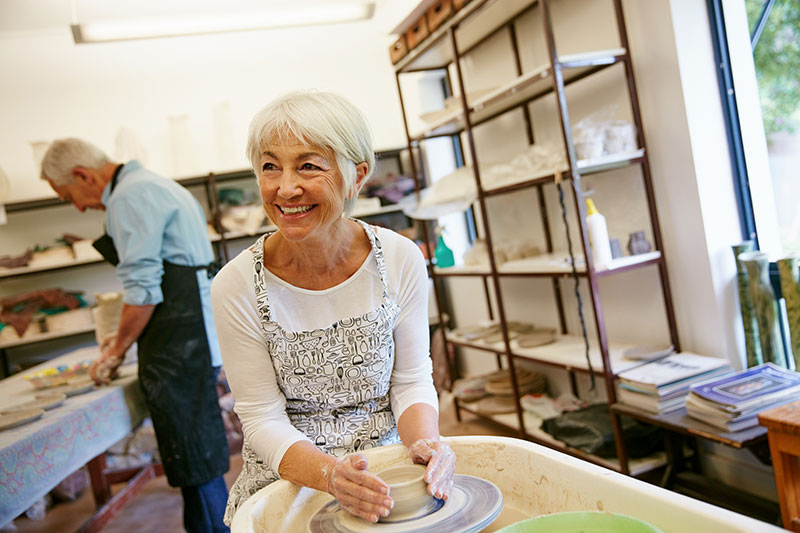There are many assumptions out there about aging – some are true, some are half true, and some are just plain wrong. Here we look at eight of the more common myths about aging.
Growing older doesn’t mean that you have to stop enjoying the things you used to or stop improving yourself through learning opportunities and new experiences. Older adults who live in senior living communities, like Lutheran Senior Services (LSS) Life Plan Communities, have many opportunities at every stage of aging to grow, learn, and contribute.
Myth #1: You’ll feel lonely and isolated.
Changing social networks are one change brought on by aging. On one hand, growing older yourself means that your relationships with friends and family are growing too. You’ll have years of memories to share with your loved ones. But getting older can also mean the opportunities to meet new people and forge new connections are harder to find. This is where senior living communities make a notable difference for older adults. According to a recent study by the Mather LifeWays Institute on Aging, 69 percent of older adults who moved to a Life Plan Community reported that this move improved their social wellness.
Myth #2: You’re less adventurous and less creative.
Creativity and adventure are not limited by age! Your ability and willingness to seek new adventures and express your creativity are up to you. It’s important to make sure that you have opportunities to be adventurous and outlets where you can be creative.
In fact, studies from the National Institute on Aging show that being active in the arts – theater, singing, and visual arts, for example – supports healthy aging. LSS senior living communities provide many opportunities for residents to be creative through choirs, art therapy, music therapy, and much more.
Myth #3: You can’t learn a new skill.
Not only can you learn new things as you age but it’s especially important to your cognitive health that you do learn new skills. Learning new things challenges your brain so it builds new pathways. While something such as learning a new instrument would really be a good challenge, even small challenges like putting jigsaw puzzles together can help your cognitive health.
Myth #4: You’ll have to give up driving.
According to the Federal Highway Administration, as of November 2020 there were more than 228 million drivers’ licenses issued. Of those 46 million were issued to people over 65 years old. At any age, drivers should take stock of their ability to safely operate a vehicle on a road with other drivers. Reaction time, confidence, and focus are just a few things to consider when determining if a person can continue to drive safely.
Some people decide that it’s safer for them to only drive during the day and use public transportation, rideshare programs, or friends and family if they need to get around in the evening hours. Many senior living communities offer options for transportation as well including regular trips to shopping areas and events in the wider community.
Myth #5: You can’t exercise strenuously.
Exercise is important at any age and how intensely you exercise should be determined with your physician. If you are in good health and your physician agrees, you can continue to complete hard workouts.
Staying active helps older adults to stay mobile and retain strength. If you aren’t able to workout at the intensity that you used to, there are many ways to modify exercises so you can still have a good workout.
Myth #6: Your joints will be achy and your bones frail.
According to Johns Hopkins Medicine, only seven to 12 percent of Americans who are 65 or older are considered frail. And while there will be some aches and pains, there are ways to minimize your risks of being achy and frail as you age.
Overall wellness is something you want to focus on to keep yourself feeling good in your later years. This includes eating well and staying active. Keeping your mind engaged and having strong social supports can also help you stay well.
Myth #7: You can expect to fall as you get older.
Falling is not a normal part of aging. While falls do happen, you can be proactive in protecting yourself from falling. Strength and balance exercises help as does having your vision checked regularly.
There are modifications that can be made to your living space to make it safer as well. Things such as grab bars in bathrooms, additional lighting in hallways, and secured rugs are all little additions that can help to prevent falls.
Myth #8: Getting dementia or Alzheimer’s is inevitable.
While forgetfulness happens to people of all ages, dementia or Alzheimer’s does not go hand-in-hand with growing older. One in nine Americans over the age of 65 has Alzheimer’s, the most common form of dementia, according to the Alzheimer’s Association. For people living with Alzheimer’s or Dementia, memory care can help.
Keeping your body and mind active can help keep you sharp. Being socially active and staying engaged with friends and family helps too.
If dementia or Alzheimer’s runs in your family, be sure to have a conversation with your physician about this and they can help you determine your risk and any signs you should watch for.
Aging is a natural part of life but by taking care of yourself and continuing to challenge yourself you can enjoy your later years. Senior living communities offer older adults many opportunities for social, physical, and spiritual wellness, while home health care services can help those who wish to remain in their current home. LSS offers the best assisted living experience in St. Louis, with amenities and opportunities in each community to keep you well.


